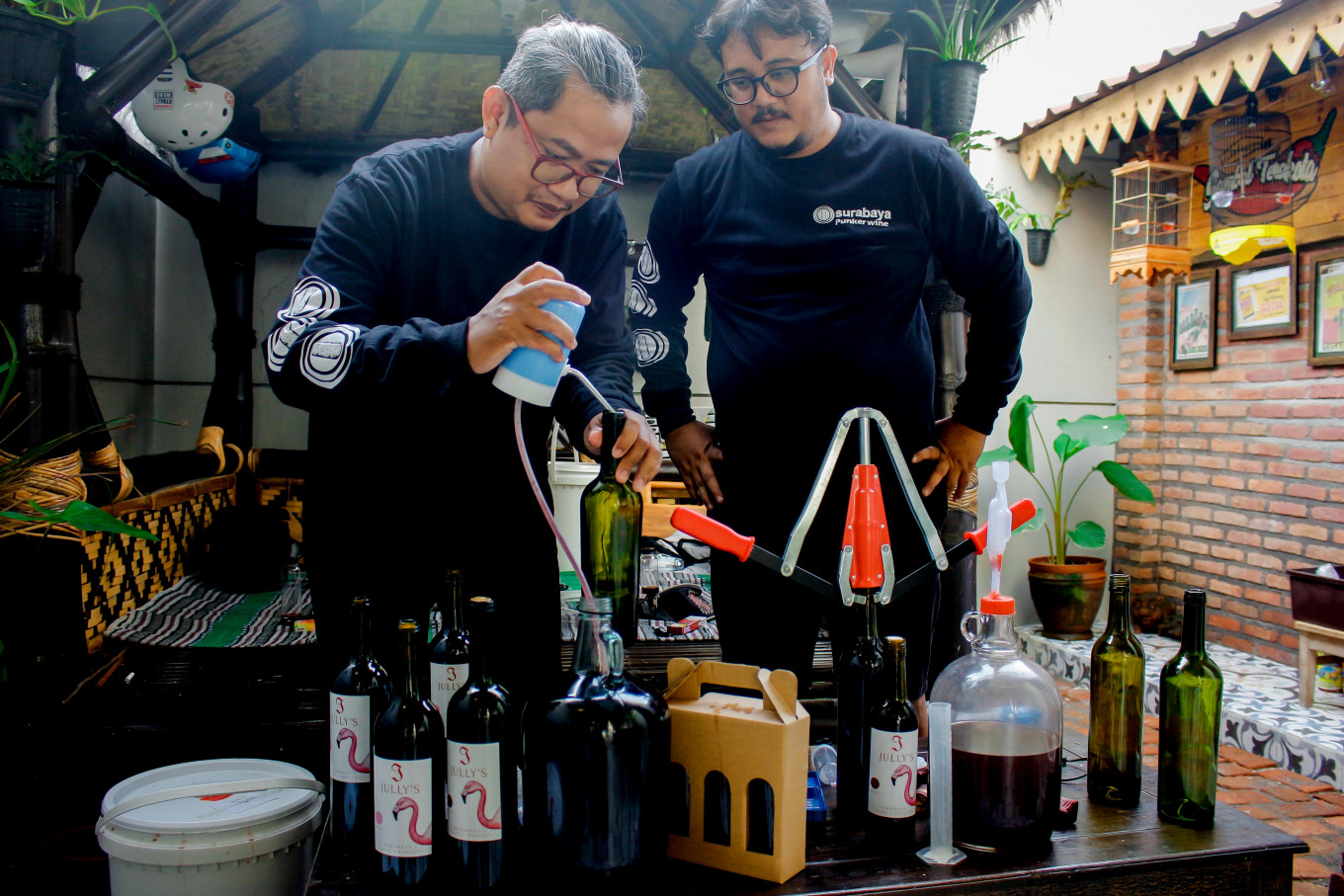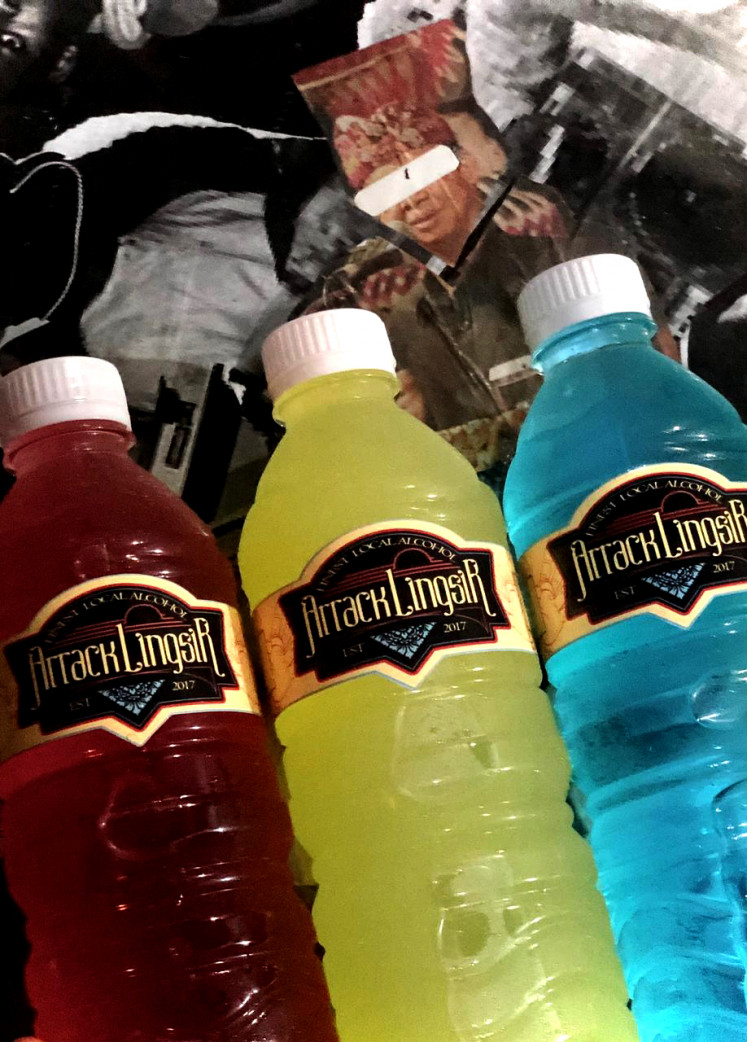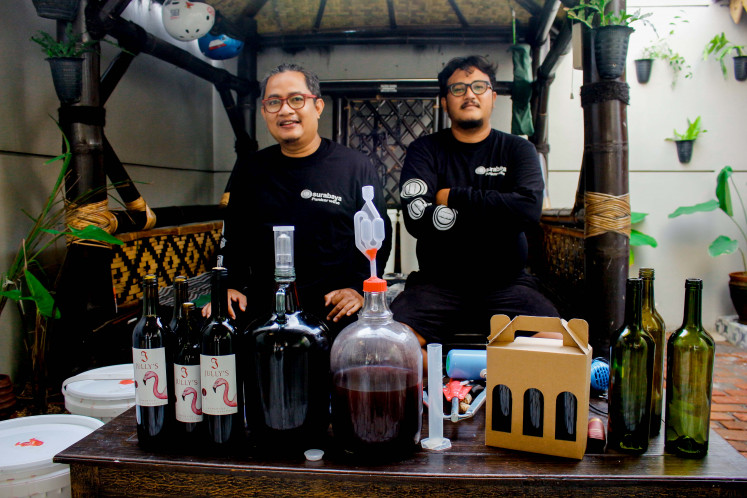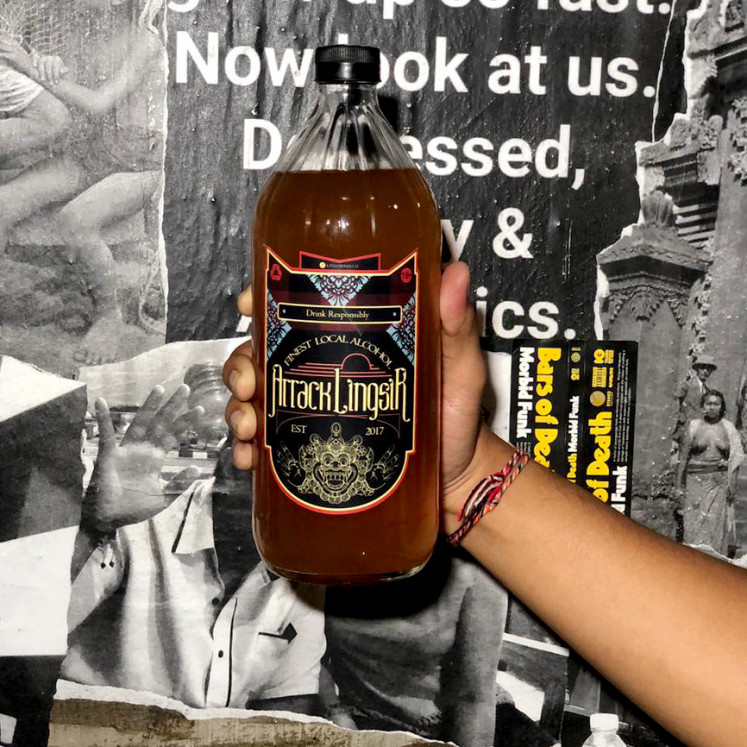Popular Reads
Top Results
Can't find what you're looking for?
View all search resultsPopular Reads
Top Results
Can't find what you're looking for?
View all search resultsSurabaya Punker Wine: Drinking and distilling between punk rock concerts
Musical communities around Indonesia bond through their love of wines, but each has different goals in mind.
Change text size
Gift Premium Articles
to Anyone
A
man with a crew cut repeatedly adjusts the position of his glasses. Beads of sweat trickle down his hands. He's busy pouring blood-red liquid from two empty barrels, each able to hold 25 kilograms of weight, into a dark-green bottle.
Close to him, in a joglo (traditional Javanese house), rows of empty bottles — similar to the one he's pouring into — are lined up, awaiting their turn. Every now and then he whistles to ward off boredom. However, he seems to really enjoy the activity that is keeping him busy that afternoon.
The bespectacled man is Arief Kurniawan. Friends call him “Plats”, which he prefers. In the afternoon The Jakarta Post met with him, it was time for the 41-year-old to bottle his fermented wine. For the past four years, Plats has kept busy exploring the fermentation process of homemade wine.
"Here, come closer and bring your nose in. Inhale slowly and deeply," Arief said as he himself inhaled with his eyes closed.
“How is it? No one knows what will heaven be like, but I think it will smell just like this,” he said with a thunderous laugh.
Plats is a member of Surabaya Punker Wine in East Java, a collective of winemakers consisting of musicians from the city's hardcore/punk scene. As a collective, they regularly hold meetings to discuss various methods of fermentation while sharing the results of their respective brewing experiments with each other.
Alcoholic drinks produced by Arak Lingsir. (JP/Courtesy of Arak Lingsir)The goal of their movement is a simple one: to provide an alternative to mass-produced alcoholic beverages, which are often pricey. They also want to supply the public with alcoholic drinks that have authentically local flavors.
"[The fermentation process represents] the punkness of our trade. Our method is independent, experimental. And we only share it with friends in the scene,” said Yoyon Sukaryono, 44, who is chairman of Surabaya Punker Wine.
In his life outside of wine, Yoyon helps rehabilitate children who have had confrontations with the law.
Both avid drinkers, Yoyon and Plats said after learning the process of brewing homemade wine, they lost interest in tasting mass-manufactured alcoholic drinks. For them, the wine they create is more “organic” and “nutritious” for their health.
Yoyon added that the uric acid levels in his blood noticeably decreased when he started drinking only his self-made wine. Plats, meanwhile, said homemade wine was beneficial for male vitality.
"My wife has recommended it to her friends," said Plats, who also runs a property agency with his wife.
Yoyon Sukaryono (left) and Arief Kurniawan in their headquarters in Surabaya, East Java. (JP/Ian Def)So far, members of the Surabaya Punker Wine collective have distributed their products by hand. They don't have a set price because business isn't their main goal. They merely make sure that their production costs are covered.
“Even though it is a matter of taste, I dare to compete with the luxury wines that are sold in the market,” Plats said, adding that he recalled going to a wine fair once and not being impressed.
Legalizing the trade
President Joko “Jokowi” Widodo announced on March 1 that he planned to issue a new regulation regarding investment in liquor production. The regulation was to be included in Presidential Regulation (Perpres) No. 10/2021 on the business investment sector.
Two days after the statement and receiving pressure from the public, through a video broadcasted on the YouTube channel of the Presidential Secretariat, the President declared that he had withdrawn the proposed regulation. The decision withered the hopes of local distillers and wineries to expand their distribution network.
Plats hopes the law will still be enacted in the future. For him, this will allow home wineries such as those belonging to Surabaya Punker Wine members to legally distribute their product. According to Plats and Yoyon, the ease of local wine production means it can be a boon for Indonesia's small and medium enterprises (SME).
"Because the wine fermentation process is zero waste. We can drink the water. Later, the remaining fermented fruit sediment can be used for fertilizer or yeast,” Yoyon explained.
Not everyone from the independent liquor ecosystem agrees. Windu, the frontman of a Balinese hip-hop collective called Madness On Tha Block (MOTB) who is also a trader of independent spirits, said the existence of a new policy on liquor investment would change nothing for small-time players like himself.
A bottle of Arak Lingsir spirit. (JP/Courtesy of Arak Lingsir)Windu's products are branded under Arak Lingsir and they are also distributed in small batches, often at music gigs. He works with farmers in his village in Karangasem regency and uses coconut water — which is boiled in jumbo-sized pans for hours — as his main ingredient. He has no big commercial hopes for Arak Lingsir and merely wants to continue a Balinese tradition (spirits are often used in Balinese rituals).
Yoyon said: “For us, every drop contains the meaning of ‘brotherhood’. Many of us who were strangers at first quickly became close because of drinking together. There is a brotherhood spirit pouring out of every glass we drink as a group.”














